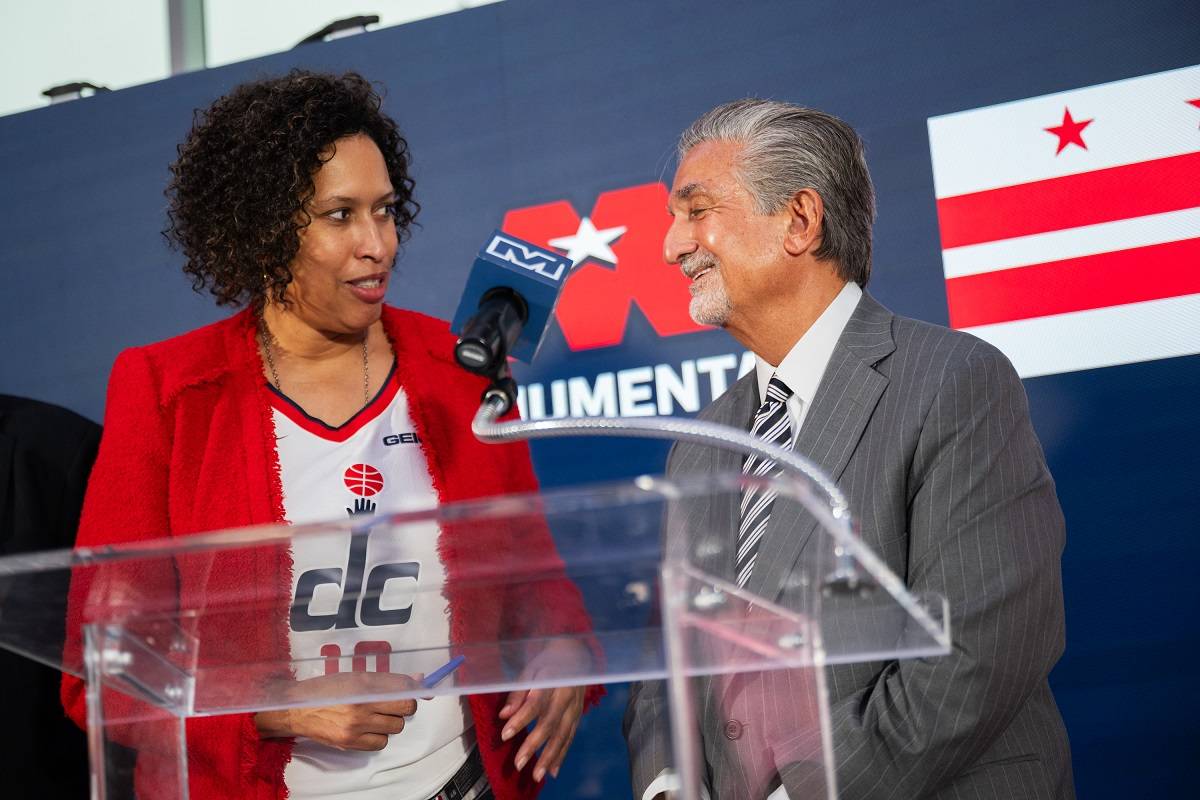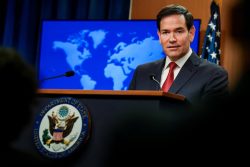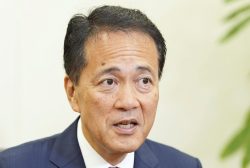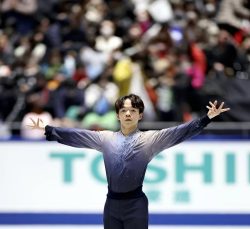
D.C. Mayor Muriel E. Bowser (D) and Ted Leonsis, the owner of the Wizards and Capitals, at a news conference Wednesday following their announcement that the teams will stay at Capital One Arena in the District.
15:20 JST, April 1, 2024
One detail stood out to D.C. Mayor Muriel E. Bowser on the December morning that the billionaire owner of the Wizards and Capitals, Ted Leonsis, announced he was moving the Washington teams to Virginia: He hadn’t signed a thing.
There was no contract, “no real commitment,” Bowser (D) said – only a handshake with Virginia Gov. Glenn Youngkin (R) that in Bowser’s eyes meant D.C. still had a shot.
From that point, Bowser said in an interview Friday, she decided, “we were going to put our foot on the gas.” Over the next several months, periodically over drinks at the Waldorf Astoria, Bowser would quietly work to bring Leonsis back to the negotiating table, sweetening D.C.’s offer just as Leonsis’s plans were falling apart in Virginia’s General Assembly. She insisted for months publicly that D.C. remained in the game. Few shared her optimism at the onset.
But on Wednesday, Bowser got her ultimate told-you-so moment, turning what could have been a legacy-wounding loss of two professional sports teams into a defining career feat as she appeared with Leonsis to announce a $515 million deal to keep the teams at Capital One Arena until at least 2050.
“She went from friend, mayor, cheerleader for D.C. to, ‘I can deliver the city council … and then I can deliver the rest of the city, and [Deputy Mayor Nina Albert] will coordinate it.’ And it crescendoed,” Leonsis said in a Friday interview. “That’s literally how I see it happening, at a time when Virginia was not as integrated. I had Alexandria and Richmond and the governor’s office, and they were not singing the same tune. Well, D.C. really was.”
The deal the mayor and Leonsis signed is more comprehensive and favorable to Leonsis compared with the $500 million offer put forth in December, as he was already preparing to make his announcement with Youngkin. It’s expected to allow Leonsis to expand Monumental Sports & Entertainment’s footprint at neighboring Gallery Place by 200,000 square feet, offering a significant boost to the city’s downtown business landscape in the process. And among other perks it beefs up security around the arena, requiring 17 police officers patrolling two hours before and after games.
Bowser had been criticized for failing to deliver a more significant offer to Leonsis last year until the 11th hour – but now Bowser says that was the kick in the pants city leaders needed to regroup with a more focused approach.
“I’ll be candid, I learned some lessons with the last approach,” Bowser said of her failure last year to keep Leonsis from trying to take his teams across the Potomac River to Virginia. “And I think that the council and I have been in lockstep ever since December about how to move forward together.”
A chance encounter
Bowser and Leonsis’s rekindled negotiations started with a chance encounter at the Waldorf Astoria in mid-January, about a month after Youngkin and Leonsis announced the move. Leonsis’s investment company, Revolution Growth, was holding its annual conference at the glitzy hotel on Pennsylvania Avenue, blocks from Bowser’s office at the Wilson Building. After remarks from Sen. Mark R. Warner (D-Va.), Leonsis stepped out of the ballroom into the lobby – “and I literally walk into the mayor,” Leonsis said.
“Ted!” she exclaimed.
“I said, ‘Hey, what are you doing here?’” Leonsis recalled. She’d come to the hotel for an unrelated meeting. “I said, ‘Oh, let’s sit down – I haven’t seen you in a while,’” Leonsis said – not since he told her he was moving to Virginia.
As Bowser tells it, the two embraced before sitting down to talk.
“At the conclusion of that conversation, we made an important decision: The two of us were going to talk directly. No interference, no helpful support from our staff, just us,” Bowser said. “I think that was a turning point into us both understanding his vision and needs, and me communicating to him where the city was going.”
It was the first of several meetings, in the same place, on the same couch, that ultimately helped Bowser lure Leonsis back as his plans in Virginia started to unravel. Reopening the line of communication wasn’t tense or awkward, Leonsis said, because the mayor had avoided “badmouthing” him after he announced he was off to Alexandria. He said he told the mayor at that time that they should continue “being friends” – “because who knows what’s going to happen?”
“Initially, I could tell she was mad. But that’s why I give her credit. She kept working it,” Leonsis said.
In the meantime, he said, the mayor kept texting him news articles about the city’s progress on a number of critical issues. She also sent D.C. Police Chief Pamela A. Smith to hear Leonsis out on his concerns about crime or traffic congestion around the arena. A dinner here. A ballgame or two there. And in the backdrop, a series of events from mid-February to mid-March started to build momentum for D.C., catching Leonsis’s attention, he said.
There was a new “Safe Commercial Corridor” police hub that opened Feb. 12 right across the street from the arena, speaking to Leonsis’s concerns about security in the area. There was the $400 million Downtown Action Plan that the city rolled out Feb. 29, a vision to revitalize the whole city core – something Leonsis had felt was missing while “bleeding from a thousand cuts” in a deteriorating downtown the last several years. There was the enormous public safety omnibus bill, Secure D.C., that the D.C. Council passed March 5, including controversial anti-loitering “drug-free zones” – one of which police quickly set up right outside the arena at the Chinatown-Gallery Place Metro stop.
“All those pieces came together at the exact right time,” Bowser said, noting that after she rolled out her Gallery Place-Chinatown Task Force, Leonsis remarked that the city appeared to be planning for a future without him.
“I was like, ‘That’s true. That’s not the way we want to go, but we will go,’” she added.
Then came March 9, when the Virginia General Assembly adjourned – and left the $2 billion Potomac Yard arena plan out of the budget, a crucial setback for Youngkin’s effort to score his own legacy-defining economic development win.
In Council Chairman Phil Mendelson’s mind, that’s when D.C.’s opportunity crystallized.
“When Monumental made its announcement in December, the District had no leverage left to change his mind. However, we did nothing to burn bridges,” Mendelson (D) said. “As the deal ran into increasing friction and trouble in Virginia, the fact we were still good with our offer and had not alienated Monumental meant we became more attractive.”
Asked if the General Assembly’s exclusion of the arena from the budget was the pivotal development spurring the D.C. return, Leonsis said that it “certainly caught my attention.” But at the same time, he said, what stood out to him was that D.C. brought a starkly contrasting, unified approach that was absent in Virginia, where political spats between Youngkin and Sen. L. Louise Lucas (D-Portsmouth), the chief blockade to the arena deal, dominated the dynamic.
There was an irony in it all: In a state where politicians love to brag on its business-friendly climate, with a wealthy governor who often touts his business chops as former co-chief executive of a private equity firm, Leonsis said, “I never expected that D.C. would be easier to negotiate a massive business deal.” (Youngkin defended his handling of the tentative deal, telling The Washington Post he would not have done anything differently.)
At the news conference Wednesday, Leonsis said Mendelson suggested making T-shirts about it.
‘Our DNA is already here’
After Leonsis’s handshake agreement with Youngkin failed in the budget stalemate, Leonsis said Virginia officials started “getting aggressive” with counteroffers, sensing the potential deal slipping away. One lawmaker and other Virginia businesspeople floated a Hail Mary idea to pair the arena with a casino in Tysons – drawing a hard no from Leonsis and Youngkin.
Leonsis had to consider his options: What could he gain for his company and fans by continuing to try to forge a path to a deal in Virginia? What could he gain remaining in D.C.?
“We had to remember that our DNA is already here,” Leonsis said of the District. “The building was already here. Right? So my biggest issue was, can I innovate and add things?”
That’s where a looming real estate deal at Gallery Place came into play – the 260,000 square feet of retail that was once a bustling mall anchored by a Bed, Bath and Beyond and a movie theater, plus underground parking and office space. The pandemic hasn’t been kind to the mall, which sits right next to Capital One Arena and Monumental’s new offices; it’s now half-vacant and in a court receivership.
“I heard what he said in Virginia about being able to build from scratch, being able to have this pedestrian space and being able to get bigger,” Bowser said. While she couldn’t promise him a dozen acres like in Alexandria, she said, “You’re in the heart of downtown Washington – you can build an urban campus if that’s what you want.”
For Leonsis, it’s what helped seal the deal.
Mendelson said the city since December has explored how Leonsis’s company, Monumental Sports & Entertainment, could move into the commercial property in Gallery Place. “It’s in the interest of the developer that’s buying Gallery Place that they have a tenant and activity in the building; it’s of interest to Monumental that they’re the tenant; and it’s of interest to us that it makes the arena complex that much bigger,” Mendelson said. Robert J. Murphy, of D.C. developer MRP Realty, said that his company has the building under contract but declined to comment further.
Once MRP takes ownership of the building, it could lease space there to Monumental, probably with the District’s assistance. Bowser’s administration has been working with MRP on a public-private partnership, Leonsis and Mendelson said. That would allow Monumental to find new uses for the Gallery Place space while reconfiguring arena offices into new attractions for fans.
Leonsis said the real estate proposal firmed up over the last week, giving him the clarity to hit the brakes in Virginia and dial Bowser to say they had a deal. He made the call on Tuesday.
He told the mayor, “The first thing I will sign is with you.”
"News Services" POPULAR ARTICLE
-

American Playwright Jeremy O. Harris Arrested in Japan on Alleged Drug Smuggling
-

Japan’s Nikkei Stock Average as JGB Yields, Yen Rise on Rate-Hike Bets
-

Japan’s Nikkei Stock Average Licks Wounds after Selloff Sparked by BOJ Hike Bets (UPDATE 1)
-

Japan’s Nikkei Stock Average Buoyed by Stable Yen; SoftBank’s Slide Caps Gains (UPDATE 1)
-

Japanese Bond Yields Zoom, Stocks Slide as Rate Hike Looms
JN ACCESS RANKING
-

Keidanren Chairman Yoshinobu Tsutsui Visits Kashiwazaki-Kariwa Nuclear Power Plant; Inspects New Emergency Safety System
-

Imports of Rare Earths from China Facing Delays, May Be Caused by Deterioration of Japan-China Relations
-

University of Tokyo Professor Discusses Japanese Economic Security in Interview Ahead of Forum
-

Tokyo Economic Security Forum to Hold Inaugural Meeting Amid Tense Global Environment
-

Japan Pulls out of Vietnam Nuclear Project, Complicating Hanoi’s Power Plans




















